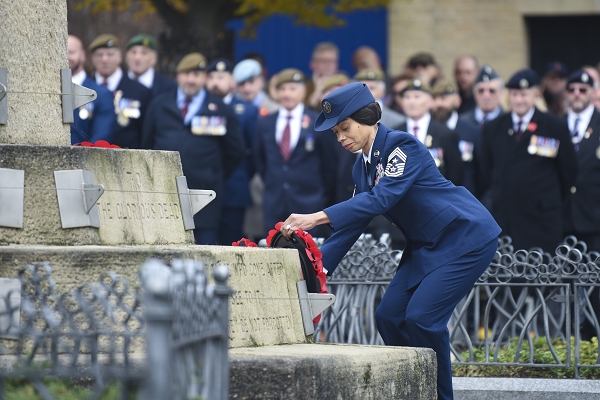
Bury St. Edmunds, United Kingdom. (November 10, 2024): “In Flanders fields the poppies blow, between the crosses, row on row.” This opening line of the poem "In Flanders Fields", written by Canadian Lieutenant Colonel John McCrae, describes the poppies growing among the graves of soldiers killed during World War I. In this photo by Technical Sergeant Timothy Moore, U.S. Air Force Chief Master Sergeant Tiffany Griego with the 100th Air Refueling Wing lays a wreath at a war memorial on Angel Hill during a Remembrance Day ceremony. By participating in Remembrance Day, the U.S. is honoring the sacrifices made by our British allies in the “war to end all wars.”
The poppy is a symbol of the blood shed by fallen soldiers in a war that was virtually unprecedented in the slaughter, carnage, and destruction it caused. Over the course of the war, over 880,000 British forces died representing a devastating six percent of the entire adult male population of the country. The war was so bloody, three times as many British forces died in a single battle than have been killed in every combat operation since World War II. The Americans suffered 116,516 military fatalities including 53,402 battle deaths and 63,114 deaths from accidents and disease. After the Civil War and World War II, World War I is the deadliest war in American history.
Worldwide military casualties are estimated to be around 8.5 million and, while difficult to determine, between six and thirteen million civilians lost their lives. Displaying little regard for innocent civilians, the German Army destroyed hundreds of cities and villages and their population was scattered across Europe and beyond.
The war ended "at the 11th hour of the 11th day of the 11th month" of 1918 which is why Remembrance Day is held on November 11th each year to honor the war dead.
The agony of the conflict is best summarized in the final passage of the poem:
“Take up our quarrel with the foe:
To you from failing hands we throw
The torch; be yours to hold it high.
If ye break faith with us who die
We shall not sleep, though poppies grow
In Flanders fields.”


